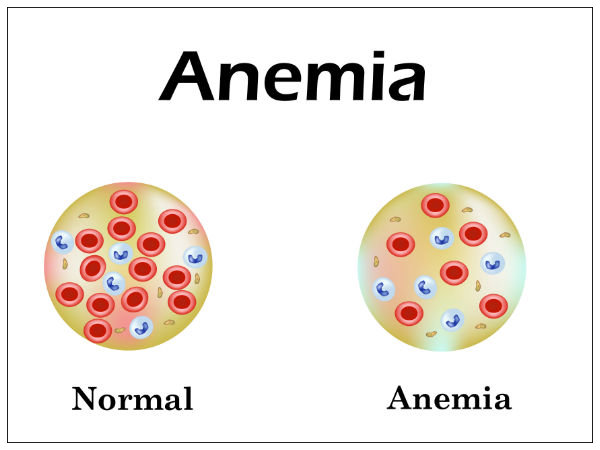Anemia Symptoms, Causes, Diagnosis and Treatment

What is Anemia
Anemia is a condition in which the blood is deficient in the body. This deficiency of blood is caused due to the deficiency of iron, which is a vital part of the protein complex, hemoglobin, present in the blood. Anemia is a blood disorder that is created when your blood lacks sufficient healthy red blood cells. These cells are the major transporters of oxygen to organs. If red blood cells are also deficient in hemoglobin, then your body is not getting adequate iron.
Anemia can occur due to some reasons. In cancer patients, anemia is a common condition. In most of the cases cancer it causes anemia. If the cancer affected area include liver, bone marrow, heart, lung, kidney etc then red blood cell production is decreased severely causing anemia. If the patient is having tumor or ulcer in the internal body organs for example intestine, bladder, or stomach etc then severe bleeding can occur which can in turn cause anemia. Chemotherapy and radiotherapy can also be responsible for anemia in cancer affected patients.
Symptoms of Anemia
The most common Symptoms of Anemia are weakness and fatigue. Anemia causes the heart to work harder to pump oxygen-rich blood through the body, therefore lessening energy to do normal activities. While mild to moderate anemia may cause very mild symptoms or none at all. Some other signs and symptoms of anemia would include:
- Shortness of breath
- Dizziness/lightheadedness
- Palpitations/heart racing
- Headache
- Coldness in the hands and feet
- Pale skin/pale inside of lower eye lid
- Change in stool color, including black and tarry stools
- Visibly bloody stools
- Paleness
- Low tolerance power
- Less energy
These signs and symptoms of anemia can occur because a low red blood cell count reduces oxygen delivery to every tissue in the body, anemia can cause a variety of signs and symptoms. It can also get worse the symptoms of almost any other underlying medical condition. If anemia is mild, it may not cause any symptoms. If anemia is gradually ongoing (chronic), the body may adapt and compensate for the change; in this case, there may not be any symptoms until the anemia becomes more severe.
Causes of Anemia
The root Causes of Anemia is commonly deficiency of iron in the diet. Though, there are many other ways in which loss of blood can take place from the body. The following are some of them:-
There are several causes of anemia, which include:
- Iron deficiency
- Kidney disease
- Pregnancy
- Poor nutrition
- Deficiency of vitamin B12 known as pernicious anemia
- Sickle cell anemia
- Thalassemia
- Alcohol
- Bone marrow related anemia
- Aplastic anemia
- Hemolytic anemia
- Active bleeding, eg. Heavy bleeding during menstration
The body needs red blood cells to survive. They carry hemoglobin, a complex protein that has iron molecules. These molecules carry oxygen from the lungs to the rest of the body. The major causes of anemia disease are not sufficient or faulty production of red blood cells, a high rate of destruction of red blood cells, and excessive bleeding.
Diagnosis of Anemia
There are different methods to diagnose anemia, but the most common is a blood test known as a complete blood count (CBC). A CBC test may be ordered by a physician as a part of routine general checkup and screening or based on clinical signs and symptoms that may suggest anemia or other blood abnormalities.
If you receive a Diagnosis of Anemia, your doctor may order further tests to find out the underlying cause. For instance, iron deficiency anemia can result from chronic bleeding of ulcers, benign polyps in the colon, colon cancer, tumors or kidney problems.
Treatment of Anemia
Anemia treatment depends on the cause.
- Iron deficiency anemia. Treatment for this form of anemia usually involves taking iron supplements and changing the diet.
If the cause of iron deficiency is loss of blood, finding the source of the bleeding and stopping it is needed. This might involve surgery. - Vitamin deficiency anemias. Treatment for folic acid and vitamin B-12 deficiency involves dietary supplements and increasing these nutrients in the diet.
People who have trouble absorbing vitamin B-12 from food might need vitamin B-12 shots. At first, the shots are every other day. In time, the shots will be shots just once a month, possibly for life.
Anemia of chronic disease. Treatment for this type of anemia focuses on the disease that’s causing it. If symptoms become severe, treatment might include getting blood, called a transfusion, or shots of a hormone called erythropoietin. - Anemias associated with bone marrow disease. Treatment of these various diseases can include medicines, chemotherapy or getting bone marrow from a donor, called a transplant.
- Aplastic anemia. Treatment for this anemia can include blood transfusions to boost levels of red blood cells. A bone marrow transplant might be needed if bone marrow can’t make healthy blood cells.
- Hemolytic anemias. Managing hemolytic anemias includes stopping medicines that might be causing it and treating infections. If the immune system is attacking red blood cells, treatment might involve taking medicines that lower immune system activity.
- Sickle cell anemia. Treatment might include oxygen, pain relievers, and hydration with fluids given through a vein, called intravenous, to reduce pain and prevent complications. Receiving blood, called a transfusion, and taking folic acid supplements and antibiotics might be involved.
A cancer drug called hydroxyurea (Droxia, Hydrea, Siklos) also is used to treat sickle cell anemia. - Thalassemia. Most forms of thalassemia are mild and need no treatment. More-severe forms of thalassemia generally require blood transfusions, folic acid supplements, medicines, a blood and bone marrow stem cell transplant, or, rarely, removing the spleen.
Reference:
https://www.mayoclinic.org/diseases-conditions/anemia/diagnosis-treatment/drc-20351366
By : Natural Health News




